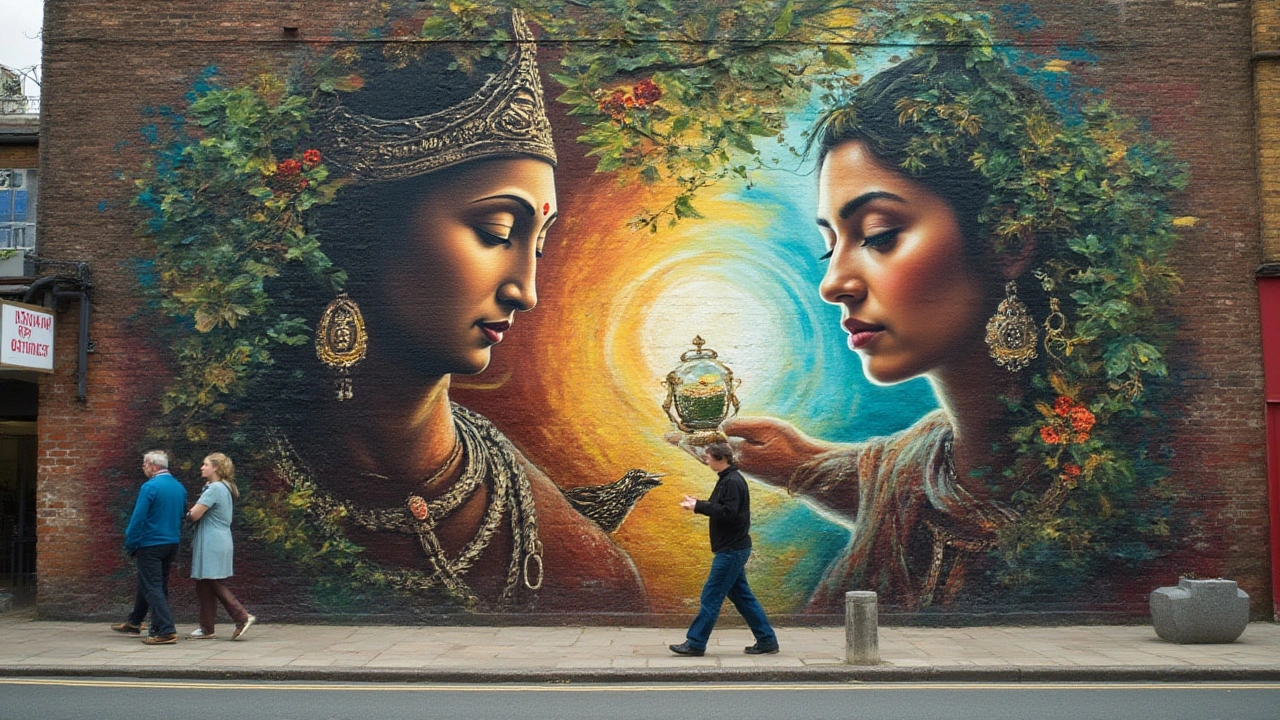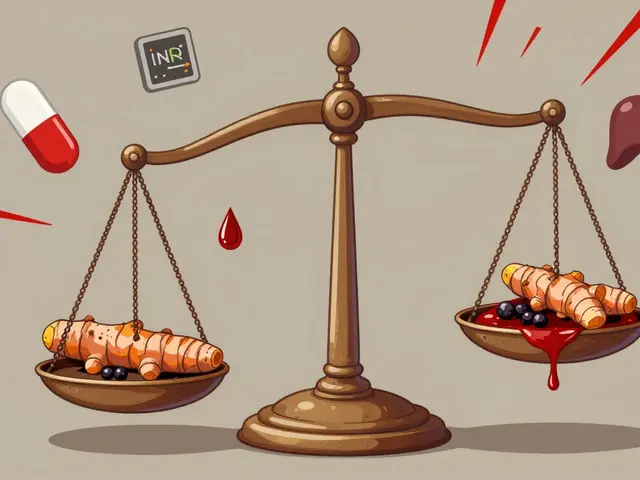Picture a single name echoing through centuries, crossing the boundaries of fable, faith, and science. Arjuna. To some, he’s the deadliest archer to ever live, a key player in the Mahabharata, India’s massive ancient epic that’s about way more than feuds and fights. To others, Arjuna is green, leafy, and full of heart-saving magic—a tree hugging riverbanks across India and showing up in Ayurvedic remedies from your grandma’s kitchen to today’s wellness aisles. This isn’t just an old story. From myth to medicine, Arjuna still feels alive and urgent, poking up in every conversation where tradition and science shake hands.
The Warrior: Arjuna in the Mahabharata
It’s wild to think one character can carry so much history, philosophy, and drama in his quiver. Arjuna, one of the five Pandava brothers in the Mahabharata, isn’t just any warrior—he’s the protégé of Lord Krishna and the person whose doubts and questions gave birth to the Bhagavad Gita, one of the world’s most influential spiritual texts. Now, it’s not like he was born a hero. His life is messy, full of dilemmas, betrayals, and heartbreak. Before each big decision (and these are often world-shaking), Arjuna hesitates. Imagine being ready to fight your own family, teachers, and friends, staring them down on a smoky battlefield, and suddenly being crushed by doubt. Not the typical “hero with no fear” storyline at all.
But here’s why Arjuna stands out. He doesn’t bottle up his worries—he talks about them, debates, pushes back against fate, and demands reasons. It’s relatable, right? We all freeze or freak out when stakes get high, and here’s a supposedly legendary hero admitting he just doesn’t know what’s right. Krishna answers not with orders, but with philosophy, yoga, and reminders about duty, compassion, and self. Those pages mix real talk with cosmic wisdom, pushing anyone who reads them—whether you’re from Delhi or Detroit—to wrestle with what it means to do the right thing. School kids in India still learn about Arjuna, and people running companies, facing dilemmas, or just stuck on what to do next read his part and think, “Yeah, that’s basically me last Monday.”
Legend Meets Leaf: Terminalia Arjuna, the Sacred Tree
If you ask a botanist about Arjuna, you won’t get swordfights or ancient drama. Instead, you’ll hear about Terminalia arjuna—a tall tree stretching over 20 meters, with bark people say is worth its weight in gold. For thousands of years, this tree sat quietly alongside the Ganges and Godavari rivers, without much fuss, until Ayurveda scholars caught on to what villagers had always known: this bark saves lives. Not exaggerating here—when crushed into powder or steeped into tea, Arjuna bark helps with heart failure, high blood pressure, and angina. Studies from All India Institute of Medical Sciences in New Delhi (like Dr. Dwivedi’s 1989 landmark paper) reported that patients with chronic heart issues improved their stamina and chest pain when taking Arjuna. Modern research keeps digging, and labs have isolated specific compounds—arjunolic acid, flavonoids, tannins—dragging this ancient remedy under the microscope and finding scientifically sound cardiac benefits.
But it’s not just about what’s in the bark. For rural communities, Arjuna trees are anchors for riverbanks, living flood barriers in monsoon season. Folk traditions wrap the tree with red threads during certain festivals, calling it the home of river spirits or the favorite resting spot of heroic souls. In many villages, when nobody could afford a doctor, healers used Arjuna bark decoctions for everything from wounds to snakebites. Rural data suggests older generations are healthier where Arjuna trees are plentiful, and environmental groups are now fighting to protect these forests—not just for birds and bugs, but for people’s hearts too.

Arjuna and the Bhagavad Gita: Doubt, Duty, and the Modern Mind
The moment you start reading the Bhagavad Gita, you realize it’s not a dusty old lecture. It’s actually the world’s most famous pep talk, delivered by Krishna to Arjuna as he sits in his chariot, shell-shocked by the prospect of battle. Krishna lays out philosophies—the yoga of action, devotion, knowledge. At the heart of it? The idea that doing your duty, without obsessing over reward or failure, matters more than sitting on the sidelines paralyzed by worry. The whole “let go of results” mantra isn’t just for monks. Tech founders, soldiers, frontline nurses, and anxious parents quote it to themselves every time things get overwhelming.
What’s cool is how much Arjuna’s crisis feels like modern burnout. There’s a cultural myth that the wise or the strong don’t doubt, but Arjuna’s weakness becomes his biggest lesson. Recent research by Indian psychologists, like the 2022 study at University of Pune, shows that reading the Gita helps people cope with stress and uncertainty—a spiritual hack, if you will, for chaotic times. When I’ve hit walls in my own life (career shifts, illness scares, fights with Adelaide), those words actually help. The story says hesitation and confusion aren’t failures; they're a sign you’re thinking deeply about what matters—a message that feels more important than ever now, with so much noise and anxiety swirling around.
Beyond the Myth: Arjuna in Modern Medicine and Fitness
Ask an Ayurvedic practitioner about their all-time favorite herb, and odds are Arjuna tops the list. But things have changed: now, you’ll find Arjuna in health-food stores as capsules, powders, energy bars, and even “heart tonic” teas. The shift isn’t just hype—clinical trials in journals like Phytomedicine or the Indian Heart Journal have shown the extract can lower blood pressure and cholesterol, slow down plaque buildup in arteries, and improve cardiac muscle function. There’s even promising research using Arjuna for stress-related hypertension, with results showing a drop in stress hormone levels and improved sleep scores among urban patients.
Fitness communities are catching on, too. Amateur runners and weekend cyclists mix Arjuna powder into smoothies to boost stamina and cut recovery time; yoga studios add it to their herbal menu. Cardiac rehab specialists in Mumbai say their patients on Arjuna supplements walk 18% farther in their treadmill tests compared to those on standard care alone. Sure, it’s not a miracle cure—you still need to quit the greasy food and stop scrolling at 2am—but the data shows it really does give the heart some backup. Just check labels or consult real professionals, since supplement quality is all over the map. And, yes, folks with allergies or complicated meds should always check in with their doctor—natural doesn’t mean risk-free.
Here’s a quick table showing what the latest studies have found about Arjuna supplementation for heart health:
| Study (Year) | Participants | Condition | Results |
|---|---|---|---|
| Dwivedi et al. (1989, AIIMS Delhi) | 105 | Chronic Stable Angina | Reduced angina episodes, improved exercise tolerance |
| Sengupta et al. (2013, Indian Heart Journal) | 60 | Coronary Artery Disease | Lowered cholesterol, improved cardiac function |
| Kalyan et al. (2016, Journal of Ayurveda) | 40 | Mild Hypertension | Decreased blood pressure, reduced stress markers |
| Siddharthan et al. (2022, Pune University) | 25 | Work-related Stress | Lowered anxiety, improved sleep |

Tips, Tricks, and Things to Watch With Arjuna
Now, if you’re eyeing Arjuna powder or thinking about flexing some Mahabharata wisdom in your daily grind, a few real-world tips won’t hurt. First, if you use the bark (or supplements), look for batch-tested brands to dodge filler-heavy junk. Ayurveda doesn’t treat all hearts the same—dosage can change if you’re cold-natured or tend to low blood pressure. Always chat with a good naturopath or physician. Curious to brew it the classic way? Steep a teaspoon of dry bark in hot water for 15 minutes—go easy at first, since the taste is earthy and a tad bitter, like strong black tea crossed with wet wood. Folks in India sweeten it with honey or cardamom.
If you’re more into the life-lessons side, try this: anytime you feel stuck, try asking yourself the Arjuna questions—“What matters here?” and “What happens if I let go of needing to control the outcome?” Jot it down. Don’t expect an instant revelation, but thinking through these dilemmas actually calms down racing thoughts. There’s even recent buzz in cognitive therapy circles about “Arjuna journaling”—writing out your hesitations, then tackling them with honest logic (and a touch of kindness) like Krishna did for Arjuna. Actually works better than most motivational posters, trust me.
If you’re traveling around India, look for riverside Arjuna trees—locals will happily point them out, especially if you ask during festival times. Join in if people are tying threads or offering water; it’s a simple, hands-on way to connect with old traditions that still carry weight.
That’s the thing about Arjuna. He’s not just a name in a dusty epic, or a footnote in wellness blogs. Whether he’s inspiring you to have hard conversations, pushing you to think deeper when everything feels like a mess, or literally giving your heart a boost, Arjuna always shows up in moments that matter. And honestly? I wouldn’t want it any other way.





July 18, 2025 AT 10:11 AM
This post is really a beautiful blend of mythology and practical wellness traditions! Arjuna truly is a multifaceted figure, bridging the heroic tales with tangible health benefits through the herbal associations. It's fascinating how cultural legends embed so much wisdom about nature and healing.
In India, Arjuna's story inspires so many ways of looking at strength and resilience, not just physically but mentally too. The notion that a sacred tree could be tied to the hero's name adds such depth, both spiritually and environmentally.
Has anyone else here come across different regional stories about Arjuna or this herb? It seems like there's so much oral tradition that complements what modern science is just beginning to appreciate.
Also, I love how this post connects the dots between ancient knowledge and modern medicine — it reminds us we shouldn't disregard traditional wisdom just because it feels old-school.
Looking forward to hearing other perspectives and any scientific insights folks can share about this herb's benefits!
July 22, 2025 AT 12:07 PM
Wow, this caught my attention big time! The way the story weaves the epic hero Arjuna with herbal power and modern wellness really resonates with me. There is something so powerful about how our ancestors understood the healing properties of nature almost intuitively.
On a personal note, I've always been interested in herbal medicine but struggle to separate hype from real benefits. Posts like this make me hopeful because they ground that interest in cultural and historical context. It feels less like a fad and more like a rediscovery of ancient healthcare systems.
Has anyone here tried any remedies related to the Arjuna tree? I’d be curious to hear about practical uses or results.
Side note: I notice the connection to heart health being highlighted a lot — that feels particularly relevant these days, given how cardiovascular issues continue to rise globally.
Definitely following this thread for more insights. Thanks for sharing!
July 26, 2025 AT 13:24 PM
To really appreciate Arjuna, one must dive into the sheer complexity of the narratives surrounding him and the botanical wonders tied to his name. It's not just superficial folklore but a layered interplay of mythology, religious symbolism, and pharmacognosy.
The tree itself, Terminalia arjuna, has a rich history in Ayurveda and is no mere coincidence to be linked with such a revered warrior. This goes beyond modern wellness trends attempting to co-opt ancient traditions without proper respect or understanding.
But does the post adequately consider how these stories and the herbal attributes have been transmitted, preserved, or even corrupted across centuries? That's the part I feel often gets glossed over.
It'd be great if more discussion touched on ethnobotany and how colonial histories impacted the global awareness of these plants — often to the detriment of indigenous knowledge holders.
It feels reductive to simply romanticize these links without acknowledging the socio-political context they exist within.
July 30, 2025 AT 15:14 PM
Honestly, while I appreciate the admiration for Arjuna, I can't help but think the hype surrounding these so-called 'herbal powers' tends to obscure the actual scientific evidence. Everyone loves to jump on the bandwagon of 'natural cures' just because it sounds exotic or tied to cultural roots.
For starters, just because a plant has historical usage doesn't automatically prove it's effective or safe. The medical claims linked to the Arjuna tree need to be rigorously tested rather than rely on anecdotes or sacred narratives.
We've seen too many cases where traditional herbal remedies are oversold, sometimes causing more harm than good, especially when people self-medicate without proper guidance.
Does anyone here know about clinical studies that back up these cardiovascular benefits? Or are we mostly looking at romanticized storytelling here?
I'm all for respecting cultural heritage, but that should never come at the cost of scientific rigor and patient safety.
August 3, 2025 AT 17:04 PM
Absolutely loving this post — it's like a perfect synergy of epic storytelling and evidence-based wellness! The metaphor of Arjuna as a warrior and the herb being a protector of the heart itself is such rich imagery.
It's critical for us wellness enthusiasts to ground our enthusiasm in both traditional lore and contemporary science so that we don't get lost in either extreme. The history acts as a narrative framework and the modern herbalism studies offer validation.
Moreover, wellness isn’t just about physical health but also mental and spiritual well-being. The symbolic presence of the sacred tree reinforces a holistic approach, reminding us that credibility can come from cultural reverence as well.
Plus, the environmental angle on preserving these botanicals speaks to sustainability efforts, which are indispensable as we venture further into natural healthcare.
Would love to see more content like this celebrating the fusion of ancient knowledge with 21st-century health paradigms.
August 7, 2025 AT 18:44 PM
I'm suspicious about the intentions behind these modern wellness promotions that capitalize on legendary figures like Arjuna. Sometimes it seems like there's a push to commercialize sacred and historical symbols for profit.
How many of these so-called herbal cures are backed by unbiased research and how many are just marketing ploys using cultural appropriation?
And who's really benefiting? The multinational companies or the indigenous communities that actually cultivated these practices?
It's worth critically examining these claims instead of blindly consuming narratives that may be a part of larger agendas to commodify traditional knowledge.
Any thoughts on how this trend impacts cultural preservation and economic justice?
August 11, 2025 AT 23:11 PM
From my perspective, as someone deeply intrigued by the intersection of history and health science, this post is a perfect example of how myth and medicine can coexist meaningfully. However, I also find it crucial to question how much of this is perpetuated by idealized storytelling versus grounded research.
Often, ancient texts and legends are romanticized, making it challenging to disentangle fact from fiction. The herbal properties tied to Arjuna's namesake tree, for instance, have been acknowledged by Ayurveda but how does this align with modern pharmacological data?
Furthermore, I wonder if we risk diluting the sacredness of cultural symbols by commercializing them so heavily. Yet, at the same time, these stories can rekindle interest in natural remedies often lost in contemporary medicine's fast pace.
I think a balance is necessary — appreciating cultural heritage and encouraging scientific validation without losing respect or oversimplifying complex traditions.
Would the author care to share more about the sources that blend these aspects successfully?
August 16, 2025 AT 01:01 AM
Well, I gotta say, this kind of glorification of 'legendary heroes' tied to wellness herbs sometimes feels like shallow narrative fluff to me. As if just calling a plant 'Arjuna' instantly makes it miraculous.
I’m skeptical when traditional heroes get repackaged as marketing icons without much critical reflection on the actual efficacy or risks involved in using these herbs.
Sure, cultural history is important, but it shouldn’t be a cover for hype. We need more transparency and less mysticism.
Nevertheless, I recognize the value in exploring these connections if done thoughtfully. It’s just that many in wellness take things at face value and ignore the need for empirical scrutiny.
Anyone else feel me here or am I the only cynic?
August 17, 2025 AT 10:07 AM
Ladies and gentlemen, we have a case of the perennial dilemma — the intoxicating allure of mysticism meets the rigidity of modern science. Let’s be clear: mere lineage to a hero or a myth doesn’t inherently bestow medical legitimacy.
Yet, dismissing the Arjuna tree outright because it is enshrined in legend is equally myopic.
The nuances of phytochemistry and ethnomedicine need a more nuanced discourse free of hocus pocus and blind skepticism.
I’d argue that medical jargon and clinical trials must be utilized to either validate or debunk the purported cardio-protective effects rather than taking either romanticism or skepticism at face value.
All said, this post does set the table nicely for a more calibrated debate, which is sadly rare in wellness discussions dominated by either snake oil or scientific dogmatism.
July 24, 2025 AT 04:34 AM
So this mix of myth and modern wellness is either a recipe for inspiration or absolute chaos, huh? Honestly, I see both sides: the beauty of cultural symbolism and the risk of overhyping herbal magic in a world full of wellness influencers without creds.
At least posts like this get us talking about where old narratives meet new health trends. It’s just that sometimes the detail gets lost if people don’t ask the hard questions.
I'm curious, does anyone have experience using Arjuna bark supplements and can share practical advice? Which brands are trustworthy? What should newbies watch out for?
Maybe we can turn this thread into a low-key resource guide with real talk.
July 28, 2025 AT 12:54 PM
As an Indian with a deep respect for our cultural heritage, I find posts like these important for bridging the gap between generations. The story of Arjuna and the herbal benefits of the Arjuna tree are more than just tales; they reflect centuries of knowledge and practice.
What’s great is that more people globally are taking an interest in Ayurvedic herbs not just for wellness but for specific health concerns like heart function.
In my experience, many herbs popularized in India are now being studied in Western labs, which provides a promising direction for integrative medicine.
I agree with other commentators who emphasize the need for scientific support but also want to highlight the immense value of cultural stories that give meaning and continuity to these practices.
Hope to see more collaborative research and respectful sharing of this knowledge world-wide.
August 14, 2025 AT 22:47 PM
Responding to the concerns about commercialization and scientific rigor — yes, these are valid points. But by placing Arjuna in this cross-disciplinary spotlight, we also invite necessary scrutiny, saving the medicine from false mythology or exploitation.
By encouraging conversations like this, the dialogue balances between reverence and reality, which is exactly what we need in wellness today.
It’s an evolving journey, not a fixed narrative.
Let’s embrace both reverence for heritage and demand for integrity in wellness products derived from these sacred sources. Balance is key.
Thanks everyone for such a rich discussion already. It’s heartening to see diverse viewpoints all engaging respectfully.